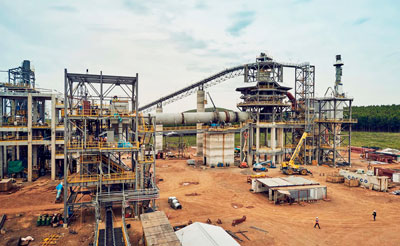By Mauro Nogarin
According to the information published in the new report by the Central Bank of Uruguay (BCU), in the second quarter of 2020, economic activity showed a very significant deterioration, registering a fall of 10.6% compared to the same period of 2019. This data constitutes the largest drop in quarterly national GDP since 1997.

Analyzing the statistical information, it can be seen that, from April to June 2020, the national GDP decreased by 9% compared to the previous quarter. Due to the impact of COVID-19, it also affected construction activity, registering the worst negative performance since the first quarter of 2015.
According to the data released by the BCU, construction activity would have registered a decline of 6.5% in the April-June 2020 period compared to the previous year. This means that the added value of construction accumulates 21 consecutive quarters of year-on-year decline, that is, a reduction of more than five years in construction activity.
However, it is important to note that the drop in construction activity includes both private construction and public works. According to the BCU, in both cases, the activity was considerably affected by the restrictions in the construction industry from March 24 to April 5, generated from the health emergency situation caused by COVID-19, and by the slower pace recorded when activities resumed in the following months.
It is also important to highlight that a stagnation of activity was generated also due to cuts and postponement of investment, both in the private sector and the public sector, where through the enactment of Decree 90/020, it sets the maximum limit of budget execution for 2020 at 85% of the credits established in 2019.
In relation to the expectations of the evolution of the activity for 2020, the survey of economic expectations by the BCU in August 2020 shows that the consulted analysts expect a contraction of 3.7 percentage points in the national GDP for the year.
However, despite the difficult situation faced by cement manufacturers in Uruguay, one of the most important investments in recent years was carried out. In fact, the breakthrough in the construction of the Cielo Azul portland cement plant in the department of Treinta y Tres has become the largest plant in the country.
With an investment of more than $100 million, it will have an approximate production capacity of 600,000 tpy. It was set to become operational in the last quarter of 2020. The company is owned by an investor group of Brazilian origin with strong ties in Uruguay, which for about 30 years has been present in the agricultural sector among others. In addition to supplying the local market, the production will aim to export to neighboring countries such as Brazil and the coast of Argentina.
In relation to construction activity, although business expectations are more dynamic for the private sector than for the economy in general, up to October there were still no positive signs reflected in a significant way in statistical terms.
In 2019, according to INE data, national production of portland cement would have been around 701,100 tons, while in 2018 it was 817,444, with a decrease of 14.23%. The national production of portland cement in the first two quarters of 2019 would have been very similar as in 2018. Where the first half of 2020, the amount of portland cement produced amounted to 332,340 tons, a level lower than that was produced in the same period of the two previous years.
According to information obtained from the foreign trade platform, having information on the value of Uruguayan exports of portland cement and on the net quantity of exported tons of this product, the average export price of a ton of portland cement from January to October 2020 was $90.
While in terms of the commercialization value of portland cement in the domestic market, according to the reference price bulletin, the price (without taxes) of a ton of portland cement would have been, on average, $205 in 2019, which indicates that by adding taxes the price would have risen to $251. However, in the period of January-October 2020, the price (without taxes) of a ton of portland cement was $19, while the price with taxes would have reached $233.
Mauro Nogarin is Cement Americas’ Latin American contributor.



